“Seeing parliamentarians in action was mind blowing,” says Vivian who manages the Beyond St Jude’s team.
Vivian was among 60 delegates from The School of St Jude, including its founder, Gemma Sisia, who were invited by the Speaker to visit the Parliament of Tanzania.
The Parliament of Tanzania is in Dodoma, a region that’s located in the center of the country and is also the country’s capital. It takes approximately six hours by road to travel from St Jude’s, which is in Arusha, Northern Tanzania to Dodoma.
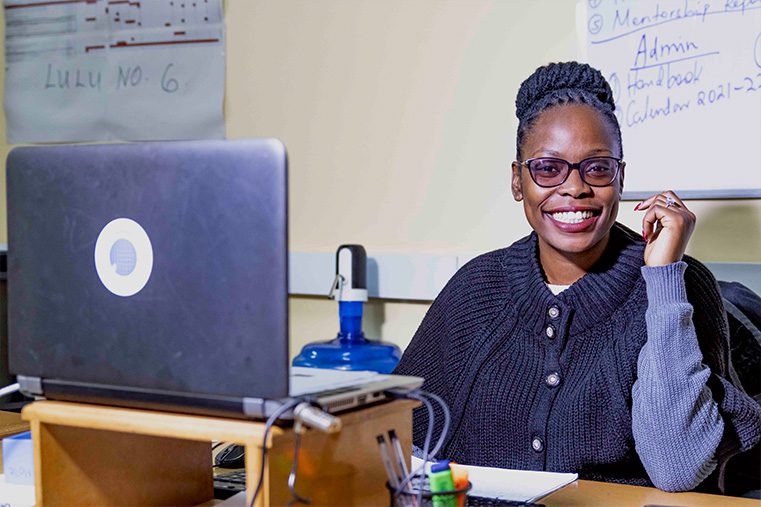
“We arrived at parliament in the early morning and we were shown where to sit. This was my first time to visit the Parliament of Tanzania. I always watch the parliament sessions on TV, but to actually see how the parliament works was an amazing experience.” Vivian reiterates.
“The Speaker introduced the St Jude’s delegates to the parliamentarians, and they were all excited to meet us. The highlight for me was when our Urban Arusha Constituency MP, Hon Mrisho Gambo, came to say hello to us and introduced us to many other government officials including the Minister for Education, Science and Technology, Hon Joyce Ndalichako.”
“The visit to parliament gave us a chance to tell the officials our own story who were all moved by the school's mission. I think it's important for the government to understand who we are and what we do for the country. St Jude's mission is aligned with the government's mission, and through the government's support, we will pursue the same goal of providing free, quality education to bright, poor Tanzanians.”
The country’s Education and Training Policy 2014* directs public bodies to ensure that education is free for all Tanzanian children. This includes the removal of all forms of fees and contributions in primary and secondary government schools. However, whilst most fees are covered, including exam fees, indirect costs for government school students still remain, such as textbooks, uniforms and school lunches.
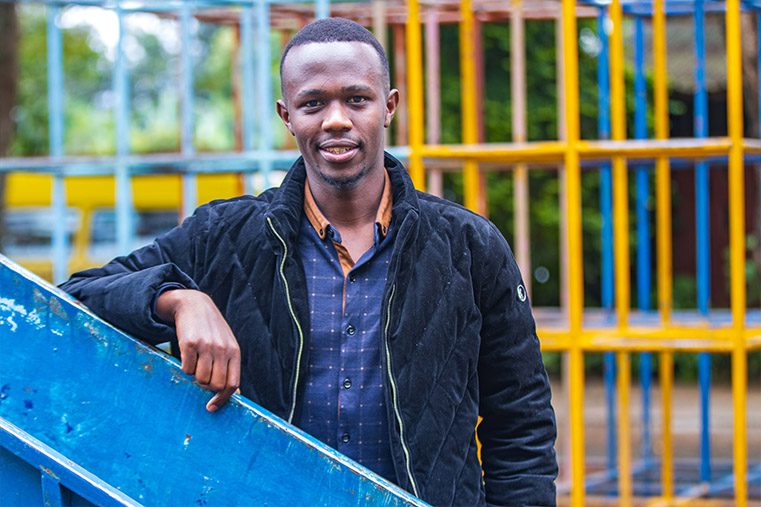
“I had a chance to meet and speak with the Minister for Education, Science and Technology. It was great to share my story with her,” says Boniface, a St Jude’s alum.
“Most of the government officials didn’t know about St Jude’s and only a few of them have heard the name, thinking it’s just an ordinary school. As someone who received a free, quality education at St Jude's, I believe this has changed their perspective and allowed them to learn more about the school's positive impact on the community. Tanzania needs to learn more about St Jude's mission,” he adds.
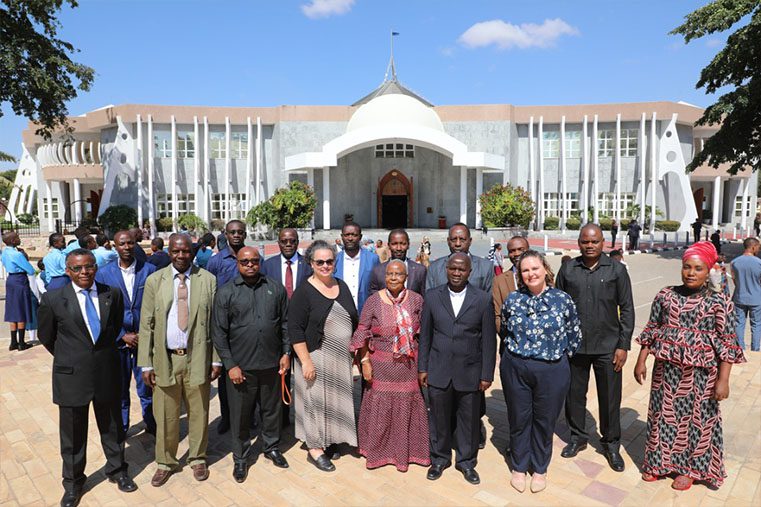
Mama Eliza, a parent leader who also serves as a member on the girls’ secondary school board, was also excited to meet the minister: “It was a privilege to meet her. I am just one of many stories of how St Jude's can change someone's life."
Mama Eliza is one of five parent leaders overseeing a larger committee of nearly 50 volunteer parent representatives. Parent representatives act as a communication link between parents or guardians and the school management.
“I shared my experience with the minister of how St Jude’s has helped turned my life around. Before my daughter received an academic scholarship, I used to be a hawker selling vegetables. Now, my life has changed, we moved from a mud house to a brick house and I now have a small shop still selling vegetables and other things,” she adds.
“I believe this visit will open doors for St Jude's. If more government officials know about the school, they can help the school accomplish its mission.”
Visitors are invited by the Parliament of Tanzania at the Speaker’s discretion. Receiving this invitation was an honour and a great opportunity to spread the word about St Jude’s to more government officials.
“It was a positive visit. Gemma managed to present in front of the Minister of Education, Science and Technology. It’s a rare occasion to get an audience with ministers,” says William, a staff representative and a member of girls’ secondary school board.
“The most important thing for an institution like ours is to be known by government officials. This visit has made the government realise that there other institutions that are supporting the education system.”
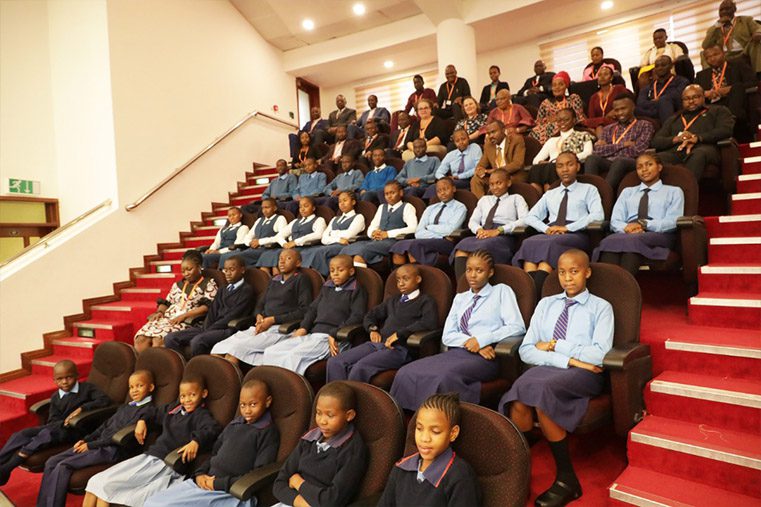
The excitement was high, especially for St Jude’s students as this was their first time to visit the Parliament of Tanzania. The delegation also had the opportunity to tour parliament house and learn about the history of the building as well as how current sessions are conducted.
Josephat and David, who are in Standard 1 and 2 respectively, were among the students who were picked to be part of the visit, “I enjoyed watching the Speaker running the parliament session,” David says.
Josephat and David are the youngest and newest students and this visit is one they will never forget.
“We got to take photos with the Prime Minister, other ministers and our Urban Arusha Constituency MP, Hon Mrisho Gambo,” Josephat and David shout together excitedly.
“The visit has motivated me to study hard. When I grow up I would like to be the President,” Josephat adds.
The visit to the Parliament of Tanzania has helped to spread the word about St Jude's work to some of Tanzania’s most important leaders. It is also a big step forward in raising awareness about the school's mission of educating bright, poor Tanzanians and empowering them to become community-focused leaders who will find solutions to assist the 45 million Tanzanians living in poverty.
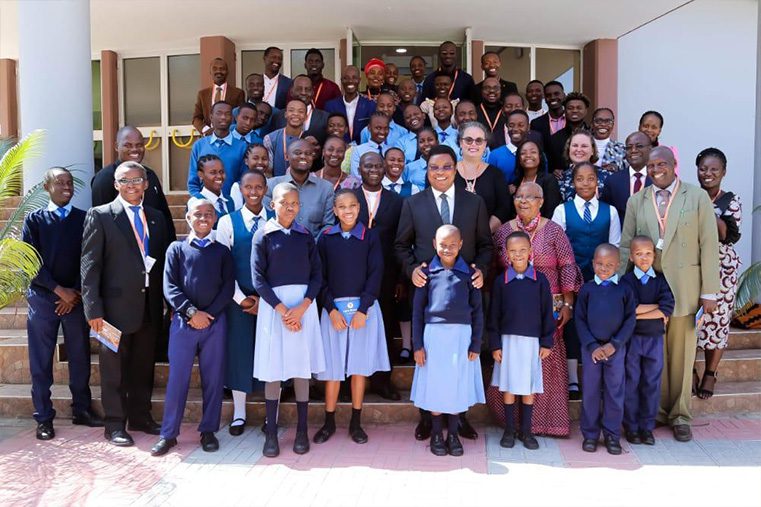
You can share our story and help raise awareness about St Jude’s both locally and internationally! Share our story with your friends and family today!
At The School of St Jude, one of the most important days on the calendar is the annual Standard 1 and 2 Student Selection Day. Long-term supporters will know the images of a sea of brightly-dressed students and parents at the St Jude’s gates. Each year, 1000 or more government school students are invited to the school for the first step in St Jude’s student selection process.
What these familiar images do not show are the months of planning and preparation needed to make Student Selection Day, and therefore our mission, a success.
This mission is to give bright, poor Tanzanian students a free, quality education. Through student selection, we find students who will benefit most from everything St Jude’s has to offer, including free uniforms, stationery, transport to school, daily meals, tuition and extracurricular activities. They’ll join a class of around 25 students, compared to classes of around 60 students in many of their government schools.
The job of organising student selection belongs to the Community Relations team. Theopister, who works in Community Relations, explains:
“Student Selection Day is the first part of our selection process. We invite students from government schools to come and try for a chance to join St Jude’s. This year we started planning it more than two months before the selection, in May.”
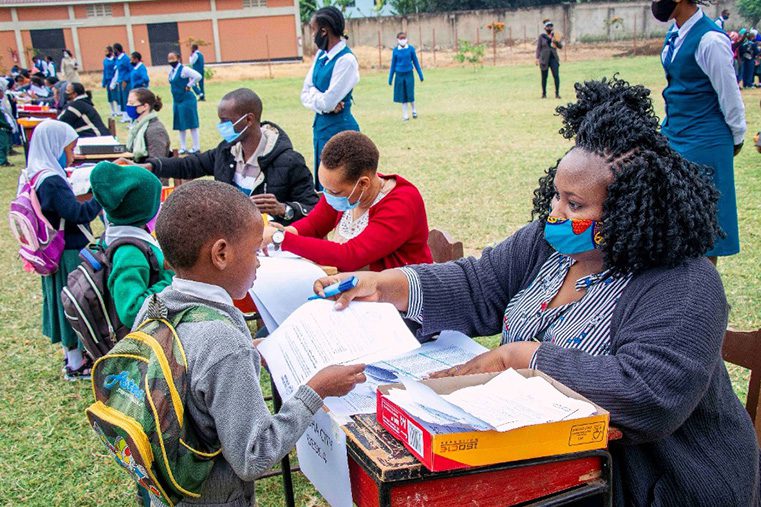
The planning process begins with inviting potential government school students. Theo’s team works closely with the Regional Education Officer to find the most academically gifted students St Jude’s should consider. “We get the top ten names from each stream at all the surrounding government schools in Arusha,” she says. “Then, we send an invitation letter to each student through their school and the headmasters give the letters to the respective students.”
The Community Relations team also makes an announcement on local radio about the upcoming Selection Day and, this year, a group of staff visited a number of markets to give out pamphlets and spread the word further to parents of potential St Jude’s students.
“Getting to interact with people was fantastic,” says Ziada, a member of the Marketing team who handed out pamphlets and spoke to community members about St Jude’s. “It was great to hear from the parents that our school is trying to reach.”
Finally, after months of planning, the big day arrives. This year, it’s 31 July. Today, 1,778 students and their parents have come to St Jude’s, all hopeful of receiving one of 50 academic scholarships to start at St Jude’s in 2022. A scholarship can change everything for a student and their family.
“Government school is free, but if you want lunch you have to pay. You need a uniform, you have to pay. Some parents will tell their children to skip their meals because they won’t be allowed to eat if they haven’t been able to pay. So some of these students will eat just once per day,” explains Theopister.
The school gates open at 7am and many people have been lining up since before 6am! When the students enter, their parents remain outside and the huge task begins.
“The process starts in the registration area. First we split the students up into districts; Arusha, Arusha City, Arusha DC and Arusha Meru and our staff help them move to the right area. Then we check their documents,” says Theopister.
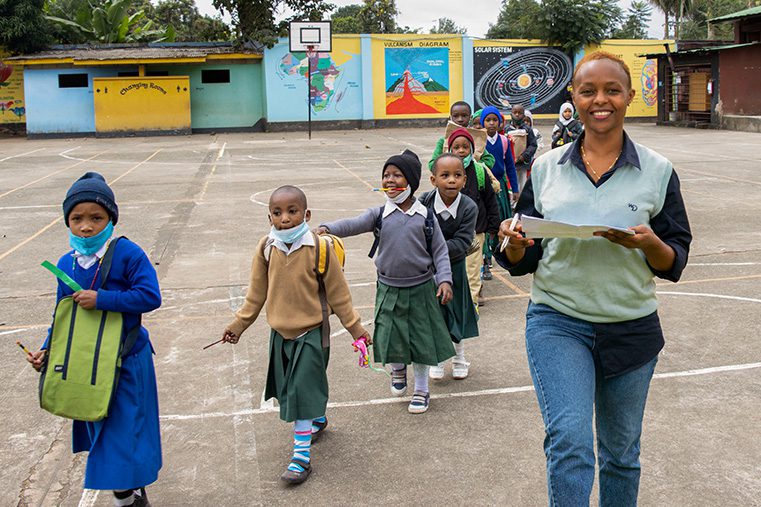
After that, it’s time for testing, gently overseen by our academic staff.
“We do arithmetic, counting one to ten and one to 20, recognising numbers. And writing a self-introduction in Swahili,” says Miss Juliet, a Standard 1 teacher who has now been involved in nine Standard 1 and 2 Student Selection Days.
It’s a huge day, but there are small moments when staff have time to think about what’s being achieved.
“My favourite time is when I’m in the hall, doing the reading test and I find a student who is just reading perfectly. It’s exciting,” smiles Miss Juliet.
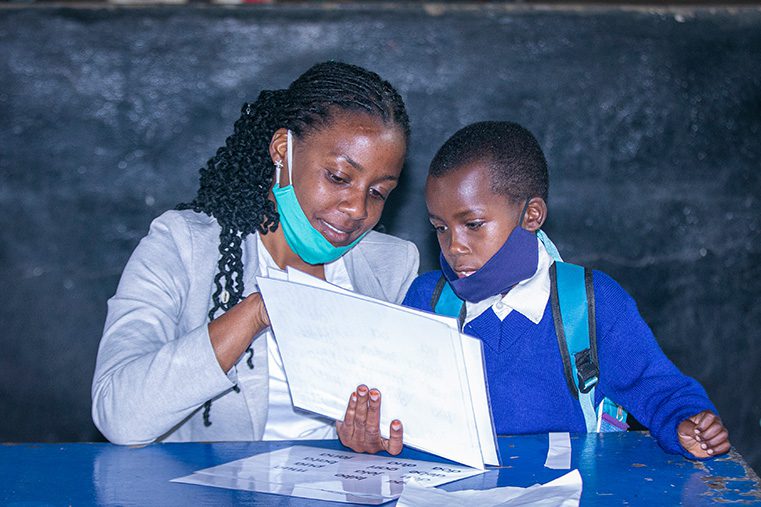
When the potential students are not being tested it’s the role of staff to keep them safe and contained. Luckily, the St Jude’s Primary School offers plenty of fun.
“Our school is blessed because we have playgrounds, and some of these students, they have never seen anything like this. So, we take them to the playgrounds and supervise them to keep them busy between testing,” she explains.
After testing, document checks and time on the playground, there’s a shortlist of potential students who meet document requirements and have passed their exams with distinction. They’re reunited with their parents and given a note, explaining when they should return to school for the next step in the selection process.
Like most staff, Miss Juliet is glad to be part of Student Selection Day at St Jude’s. In 2022, she’ll have the unique privilege of teaching the students she helped select today.
“When they come into my class, I feel excited. You get to see the change from the day you select them to the day they move to the next class,” she beams.
For 50 students, today is the beginning of that change.
Innovation begins with the spark of an idea.
Students at The School of St Jude have been demonstrating this since the first Science Day Projects Exhibition in 2010.
Science Day is an annual event that has been held at Smith Campus for the past 10 years. This year, the event took place for the first time at St Jude’s Girls' Secondary School to motivate girls to be more active in participating in STEM (science, technology, engineering and mathematics) subjects.
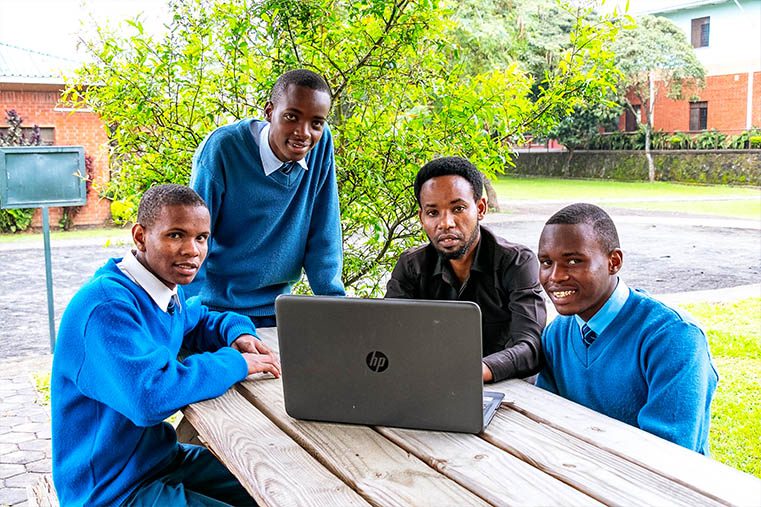
"Extraordinary inventions have been presented at Science Day by some of our best students," notes Mr Shaban, Science Day chairman of both Smith and Girls' campuses.
"Students use everyday items from school such as plastic bottles, cardboards, etc. However, we do support the students in other ways such as providing them with electronic devices so they can demonstrate their projects more efficiently," he adds.
"Science Day is important to these students because it motivates them to enjoy STEM subjects. It helps them put theory into practice. As an example, one student built a transformer using gas that worked," explains Mr Shaban.
In this year's exhibition, 97 project entries were registered for the competition.
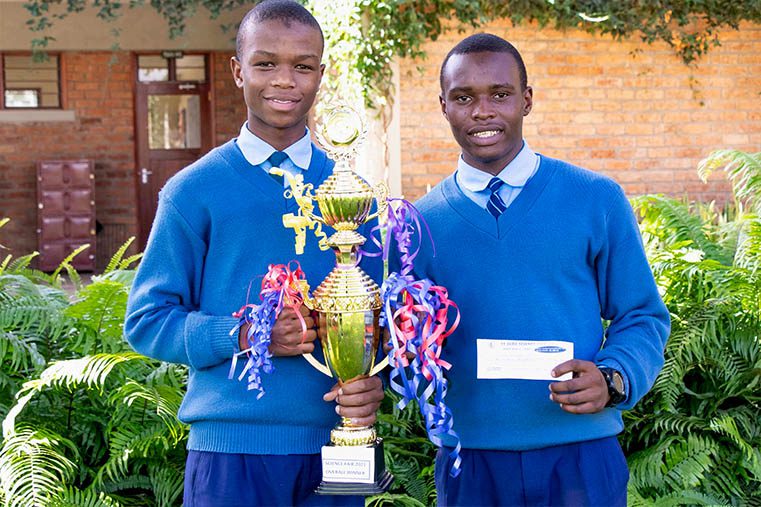
Gideon partnered with his classmate Rashid, both Form 2 students, to create their project called Automatic Secured Agriculture Controller. “This is my second time to win. The first time I won is when I was in Standard 7.”
Describing how the software functions work, "The unique thing about this project is that it provides security and controls agriculture activities such as chemical application and automated drying of crops."
These are impressive functionalities that would be very beneficial to Tanzania’s large population of agricultural industries and small-scale farmers.
Winners of the Science Fair are chosen from different categories - science, arts and design, mathematics, geography, biology, chemistry, and ICT.
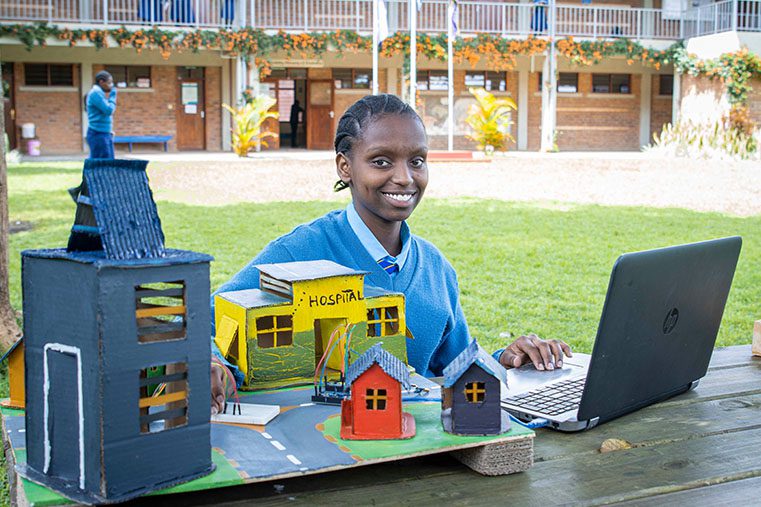
Debora, a Form 4 science student, was this year's winner from St Jude’s Girls' Secondary Campus.
Taking the top prize in the ICT category, Debora’s project, The Use of Mobile Network in Controlling Road Accidents, has been chosen to participate in the national competition.
“This project is meant to save lives by preventing traffic accidents,” she explains.
"I used various materials to design the project, including ultrasonic sensors to measure distances between cars, different jump wires, and sim card connections, as well as cardboard and bottle tops to demonstrate the concept," she further describes.
"I am truly thrilled that the project has been accepted to compete at the national level. So I'm trying hard to make some adjustments and modify the project so I can bring home the prize. We would also like to incorporate an alcohol detection sensor into the system,” Deborah excitedly says.
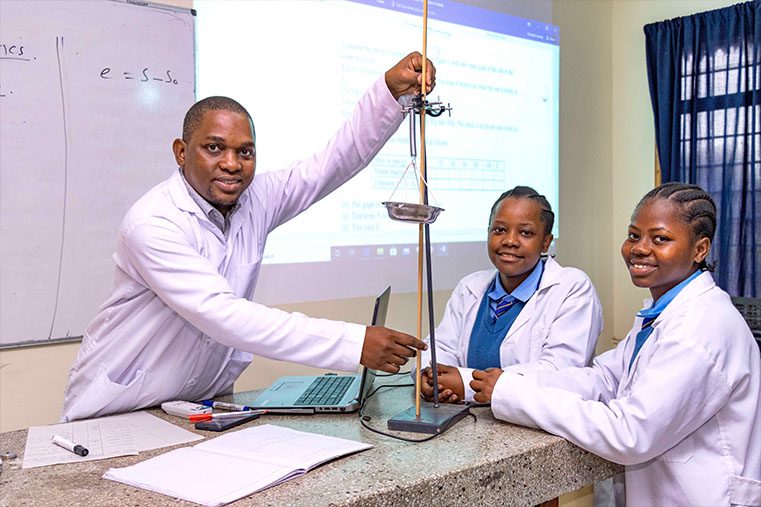
Mr Matotola is a mentor to science and ICT projects. He also coordinates the Science Day.
“Five projects from the Science Day have been selected to compete at the national level this year. One of them is Debora's project. So it’s truly exciting!,” says Mr Matotola.
“Girls are always eager to learn. We would like to see more girls interested in STEM subjects, so holding the Science Day on their campus will skew them in that direction," he enthusiastically remarks.
In this year's Science Day, 57% of girls participated, compared to 43% of boys. This shows how girls were driven and are ready to innovate incredible projects.
Every year, students present new creative, innovative and technological ideas at Science Day. St Jude's promotes creativity and encourages students to create projects that will benefit their communities to lift them out of poverty and improve their quality of life.
Increasingly, the best schools around the world are coming to the same conclusion; a holistic education that includes sports and arts alongside academics, helps students become well-rounded adults. Not to be left behind, St Jude’s has re-evaluated the way we provide our students with a well-rounded education. Over the last 12 months, our popular Sports Program has been updated, modernised and expanded.
Mr Jenerali is the driving force behind St Jude’s improved Sports Program.
“Sport is an avenue for students to let go, to get outside and de-stress, to burn a little energy. Then there’s the social aspect of it as well. Students learn soft skills too; communication, grit, leadership skills, they learn to take responsibility and to see what they can contribute to the team,” says Mr Jenerali.
A Driving Force: Mr Jenerali has spent the last 12 months revamping St Jude’s Sports Program.
Until now, St Jude’s students have participated and excelled in sports commonly played in Tanzania; football, basketball, netball, volleyball, handball and athletics. While these popular sports certainly have their place, Mr Jenerali was keen to diversify.
“It was important to introduce new sports,” he explains. “Mainly it’s about physical literacy. The philosophy of this program is about long-term athlete development. Younger students don’t specialise in a certain sport, they do rotations every two months. It’s all about fun and then they grow into specialising after a while. Then when they’re older, they tend to be more active in sports, even after school. It builds enjoyment of physical activity.”
Now, there is a year-round program of sports, which includes traditional sports in summer. In winter, students play martial arts, cricket, tennis, rugby and badminton. Athletics is offered all year.
To get these new sports started, St Jude’s needed specialist coaches. Previously, three coaches taught St Jude’s 1,800 students. Today, there are 22 coaches in addition to the schools’ PE teachers.
These new sports have been enthusiastically received. In particular, martial arts has proved unexpectedly popular among secondary students. “We’re actually struggling to have enough space for everyone who wants to do it,” laughs Mr Jenerali.
Sensei Issa is the martial arts coach. He started at St Jude’s just three months ago and has already seen improvement in his students. “Since they began taking my class, I have noticed progress. At the moment, I am teaching students how to defend themselves and I'm also working on getting them physically fit,” he explains.
Since 2004, Sensei Issa has taught students privately, but he has enjoyed working with St Jude’s. “I think St Jude's Sports Program is excellent,” he says, “It helps makes sports more popular in the school.”
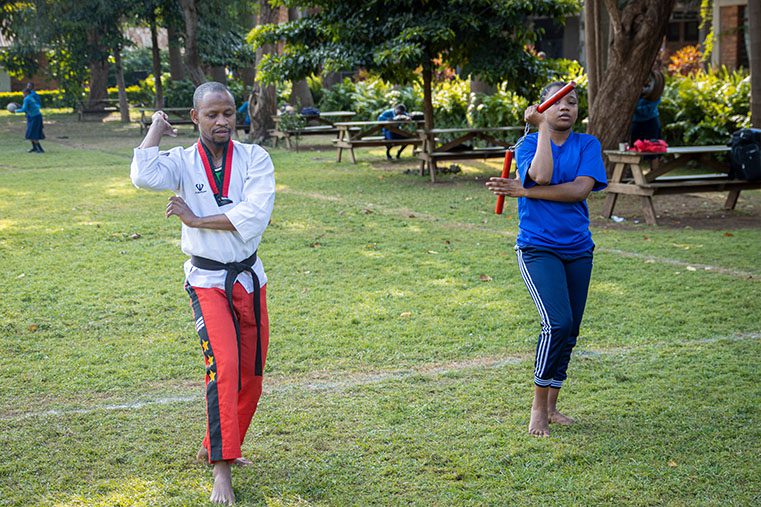
Students are enjoying their new-and-improved Sports Program. While not every student can be a star-player, everyone can have fun being active and learn from being on a team.
One such enthusiastic student is Costantine in Standard 5. In the summer, he loves to play football and during winter his favourite sport is athletics. He trains on Wednesday and Thursday afternoons and competes on most Saturday mornings.
“I like my athletics coach and I like training. It’s really fun,” he beams. “I hope one day I can be a professional football player. I play forward or mid-field and I am working on my speed.”
Costantine agrees with experts who say that sports help students academically. “When you play sports you can stay fit and healthy, so you don’t get sick and miss your studies,” he says.
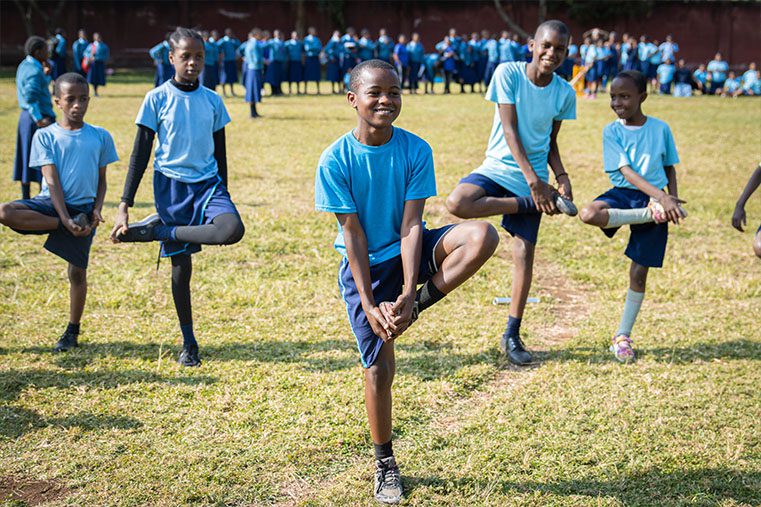
Over at St Jude’s Girls’ Secondary School, the new winter sports offerings have been welcomed by the students. Janet, in Form 3, is usually found on the basketball court, but this winter she’s giving martial arts a go. “I like martial arts, it’s really good. We can get fitness from it and also personal security,” she says.
Her favourite part is using the ‘dragon’ implement as seen in the photograph above. “It is hard at the start. You might accidentally hit yourself many times, but then you learn,” she laughs. “I feel more fit since I have started martial arts,” Janet continues. “My mind is more fit too, when I’m in class.”
One of Mr Jenerali’s proudest achievements at St Jude’s is, “…just seeing the enthusiasm from the students – that’s a big reward for me,” he smiles. Costantine and Janet are just two of the many enthusiastic students who make Mr Jenerali’s job so rewarding.
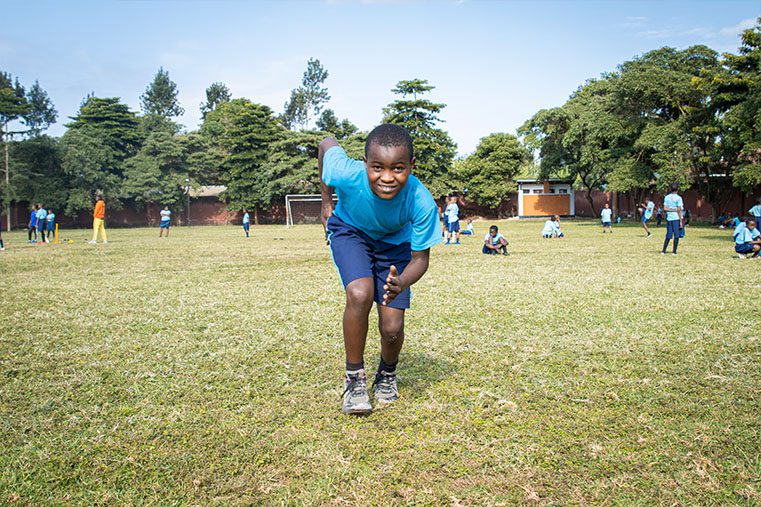
St Jude’s is constantly striving to provide our students with the best education possible. Studies from around the world show that the best education is a holistic one; an education which includes arts and sport alongside academics. Our Sports Program is an important part of a holistic St Jude’s education, which not only offers students an outlet but also complements their classroom studies.